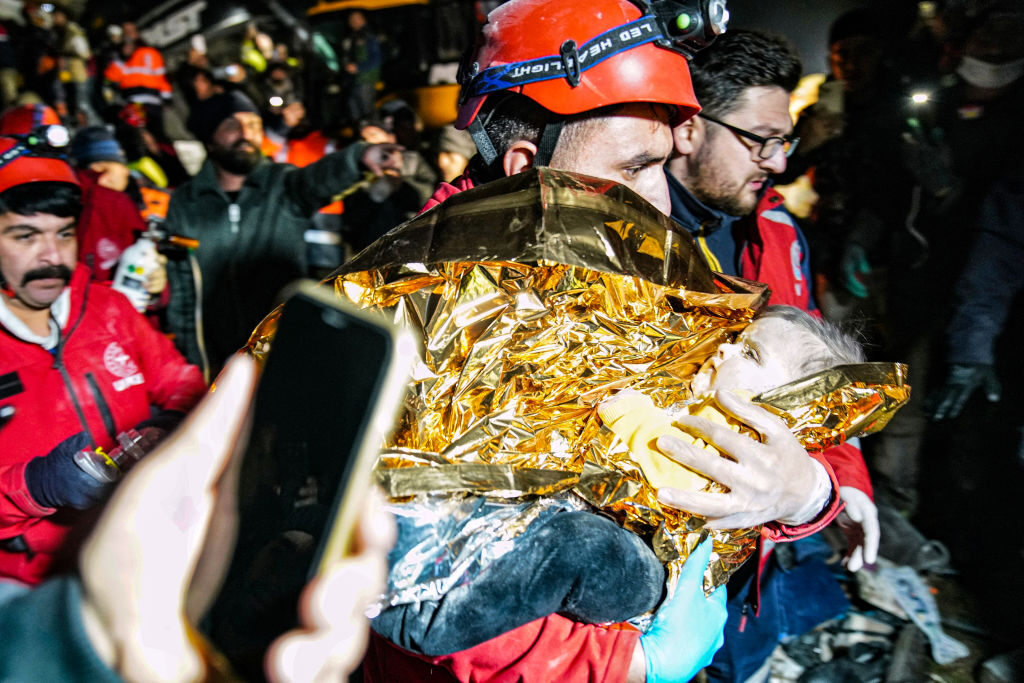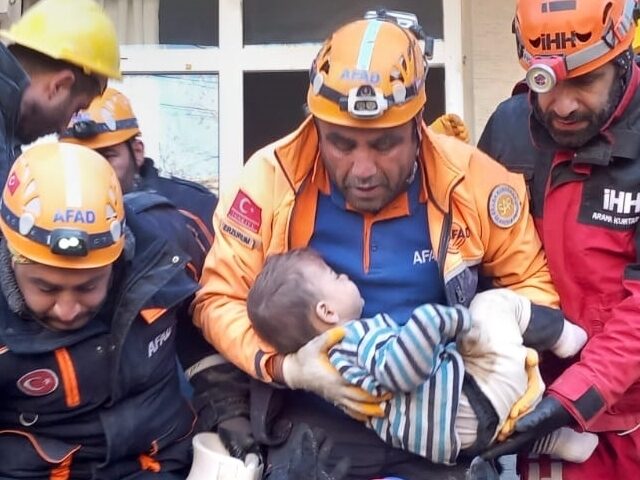The government of Turkey is struggling to address the growing problem of caring for and homing babies found in the wreckage of Monday’s devastating set of earthquakes but having no apparent adult relatives, the national newspaper Hurriyet reported on Friday.
Turkish authorities updated the death toll in the country to nearly 19,000 on Friday which, coupled with about 3,400 confirmed deaths in Syria, brings the total number of people lost to over 22,000. Even these astronomical numbers are likely to be a significant undercount given the gravity of the destruction and the remoteness of some of the areas affected.
A magnitude 7.8 earthquake hit southern Turkey in the early morning hours of Monday, followed by a series of aftershocks, the largest of 7.5 magnitude and significantly endangering first responders. Southeast Turkey and northwest Syria are the heart of the Kurdish communities of both nations. In Turkey, that has meant years of strife with Ankara and police action to subdue what the capital describes as an incessant terrorist assault by the Kurdistan Workers’ Party (PKK), a U.S.-designated terrorist organization. In Syria, the Kurdish People’s Protection Units (YPG/YPJ) largely control the region known as Rojava, or Syrian Kurdistan, meaning the government of dictator Bashar Assad has limited access and information in many of the areas most affected by the earthquakes.
The most urgent relief work for both countries is finding survivors and pulling them out of the remains of their homes. Search and rescue efforts in both countries have resulted in dramatic moments of entire families being pulled out of rubble, injured but expected to survive.
General Directorate of Foresty via StoryfulIn one case, rescuers in Afrin, Syria, saved a newborn, found still attached to her umbilical cord, under the ruins of a building devastated by the earthquake. The child’s mother is believed to have given birth while trapped under the debris and died shortly thereafter; her father is also believed to be dead. In Syria, the United Nations children’s agency UNICEF estimated on Friday that as many as 1.7 million children, already disadvantaged by the vestiges of the Syrian Civil War, have been directly affected by the earthquake – meaning they have lost a loved one, been injured, lost their homes, or endured some other kind of suffering.
In Turkey, the number of infants and toddlers rescued but unidentified and separated from their families is a growing challenge for relief efforts. According to Hurriyet, Islamist Turkish President Recep Tayyip Erdogan sent a plane belonging to his office to transfer 16 children described as “unaccompanied babies” to Ankara from the eastern city of Kahramanmaraş to receive treatment for their injuries.
“The 16 newborn and 1-year-old babies, two of whom were rescued from the rubble, were taken from Kahramanmaraş to Etlik City Hospital in Ankara,” Hurriyet reported, without offering any more information on the children. It is not clear if the government is aware of the identities of these children or in contact with their families.
Transferring injured earthquake victims out of eastern Turkey is a priority for the government, as local hospitals are believed to have been largely destroyed. The Turkish government is transferring many of those injured to the capital, Ankara, or its largest city, Istanbul.
“Citizens who are looking for their injured relatives can dial 184, the communication line of the Health Ministry or use the e-Nabız [e-Pulse, an application also run by the ministry] for their first-degree relatives, instead of going to the hospitals,” Istanbul Provincial Health Director Kemal Memişoğlu told reporters on Friday.
Turkish Police Service via StoryfulIdentifying the victims of the natural disaster, both living and dead, has also proven a difficult challenge, and one compromising the accuracy of the death toll, opposition politicians in Turkey have alleged.
“If the identity has not yet been confirmed, it is not reflected in the number of those who lost their lives. I regret to say the death toll will grow,” Ali Babacan, the head of the opposition Democracy and Progress Party (DEVA), observed on Wednesday, according to the Turkish-led Stockholm Center for Freedom, which is typically critical of the Erdogan government.
Erdogan’s response to the earthquake has incensed already inflamed tensions between the government and the general population in anticipation of this year’s presidential election, scheduled to take place in June. Erdogan has spent the past decade cementing his stranglehold on power by arresting opposition leaders and making it increasingly dangerous for dissidents to speak out. In December, Erdogan’s government sentenced the mayor of Istanbul, Ekrem Imamoglu, to two years in prison and banned him from public office for insulting public officials, a crime in Turkey. Imamoglu was largely considered to be the top presidential contender against Erdogan before the ban. The Imamoglu arrest triggered protests in which thousands of people in Istanbul took the streets in support of their mayor.
Now, a significant portion of the population of Gaziantep, a city of 2 million people, are homeless, living on the streets and surviving off of whatever they can dig up out of former buildings. A harrowing Stockholm Center for Freedom report on Thursday described parents struggling outside in the bitter cold, having lost their homes to entire total destruction or the fear that still-standing entire apartment blocks could soon collapse.

A baby is pulled from the rubble four days after the earthquake on February 10, 2023 in Hatay, Türkiye. (Cemal Yurttas/dia images via Getty)
“Gyms, mosques, schools and some stores have opened up at night. But beds are still at a premium and thousands spend the nights in cars with engines running to provide heat,” the Stockholm Center detailed. Many say they have not received any government aid.
Speaking on Friday in earthquake-stricken Adiyaman, Erdogan himself admitted that earthquake response could have been faster, lamenting robberies and looting in the wake of the emergency.
“As a nation, we are facing one of the greatest disasters in our history,” Erdogan said, according to the state-run Anadolu news agency. “We will ensure that our citizens who do not wish to stay in tents can move to residences and we will pay their rent for one year.”

COMMENTS
Please let us know if you're having issues with commenting.